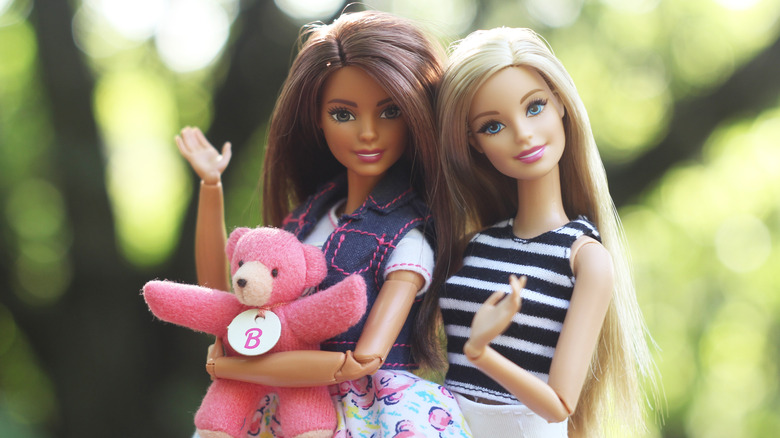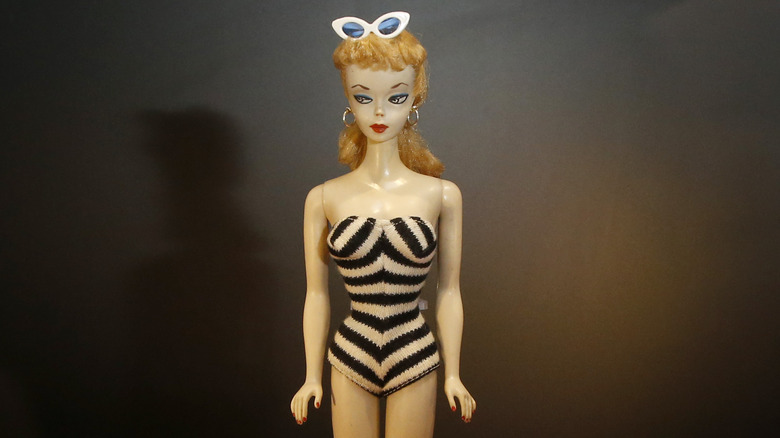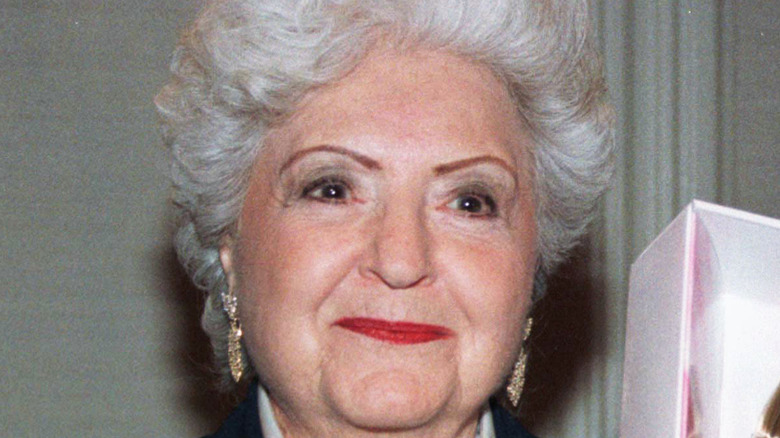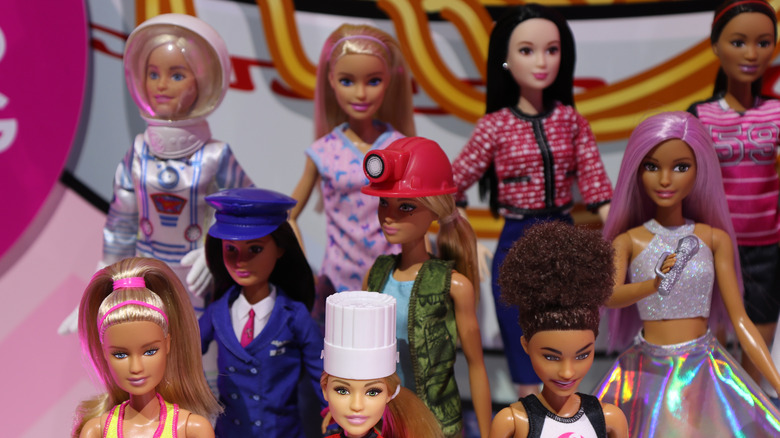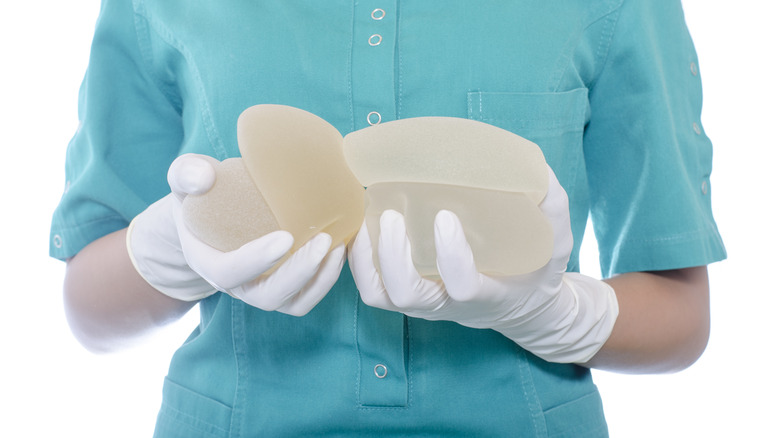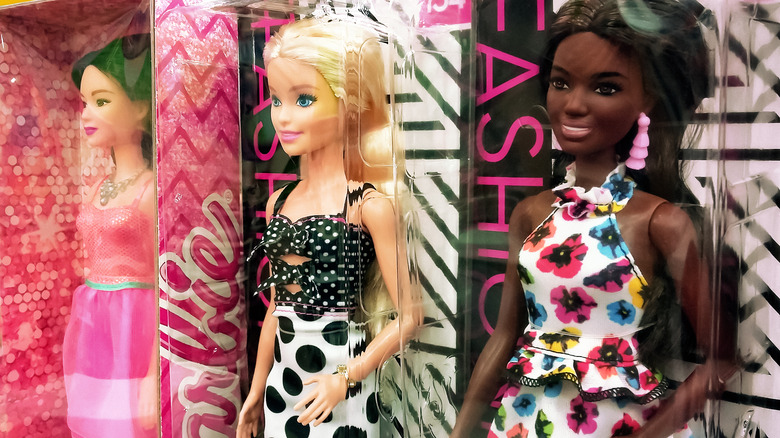Who Invented The Barbie Doll?
The creator of Barbie doll had one goal: to make dolls that encouraged girls to imagine their future selves, without putting them in a caregiver role (via Barbie Media). but what really inspired "Barbie's Mom" to create the iconic doll, and what other feats did she accomplish in her lifetime?
Per Thought Co, the Barbie doll creator was born in 1916 in Colorado. She married her high school sweetheart, Elliot Handler, in 1938. Elliot Handler and his friend Harold Mattson worked on craft projects in their garage, and named their company "Mattel" in 1945. They usually made picture frames. After Mattson sold his Mattel shares, the Handlers took over the company and began to experiment, making dollhouse furniture with leftover wood scraps.
History reports that Barbie's creator was actually inspired to create Barbie dolls based on a German sex toy she had seen named "Bild-Lilli." Bild-Lilli wore heavy makeup, a risque outfit, and had a body with exaggerated sexual features. When Handler spotted the doll during a vacation in Switzerland, she knew she wanted to create her own toned-down version of the doll for children, in order to highlight how a mature body looks.
World's first Barbie doll
Ruth Handler, the creator of the Barbie doll, was inspired by her own children, especially her daughter, who would play with traditional baby dolls along with paper dolls of adult women (via History).
Handler disliked that her daughter's toys only encouraged her to be a mom, as opposed to her son's toys, where he could envision himself having a career (via Barbie Media). She wanted her daughter to imagine herself choosing any future she wanted, from astronaut to CEO to President of the United States.
Barbie Media reports that on March 9, 1959, the first Barbie doll made her debut at the New York Toy Fair. The blonde, teenage doll wore a ponytail, and was dressed in a black and white striped bathing suit — quite a different look from most dolls at the time, which were usually babies.
Outside of the toy fair, Barbie's popularity exploded through T.V. commercials, which were some of the first T.V. ads aimed towards young kids (via History).
'Barbie's Mom'
Describing how she wanted Barbie to look, creator Ruth Handler later said in a 1977 interview, "Every little girl needed a doll through which to project herself into her dream of her future. If she was going to do role playing of what she would be like when she was 16 or 17, it was a little stupid to play with a doll that had a flat chest. So I gave it beautiful breasts" (via The New York Times). According to Thought Co., the inventor called herself "Barbie's Mom."
Thought Co. reports that the first Barbie dolls cost $3, and had blonde or brunette hair. Barbie's full name was Barbie Millicent Roberts, and according to her backstory, she hailed from Wisconsin. The New York Times reports that Barbie dolls were an immediate hit. Not only did Barbie dolls become the new "it" toy, but their success also launched Mattel into the toy giant that it is today.
New dolls, new careers
By 1959, the one-billionth Barbie doll was sold (via History). Barbie dolls soon added new characters to the lineup. Barbie's boyfriend Ken was introduced in 1961, followed by her best friend Midge in 1963, and then her sister Skipper in 1964. In 1968, Christie, the first Black Barbie doll, was released in support of Equal Rights (via Barbie Media).
Per Thought Co., Barbie dolls have now had well over 125 jobs. Per CNET, Barbie's early jobs included flight attendant, registered nurse, and tennis player. By the 1970s, Barbie became a surgeon and an Olympic skier, and in the 1980s, she took on the roles of aerobics instructor, veterinarian, and musician. The 1990s saw Barbie gain even more career opportunities, like marine corps sergeant, WNBA player, airline pilot, and dentist. And in fact, Barbie has run for President of the United States every year since 1992 (per Barbie Media).
"Barbie has always represented that a woman has choices," Ruth Handler said. "Even in her early years, Barbie did not have to settle for only being Ken's girlfriend or an inveterate shopper...I believe the choices Barbie represents helped the doll catch on initially, not just with daughters — who would one day make up the first major wave of women in management and professionals — but also with mothers."
Solving new problems
You might be surprised to learn that Barbie dolls weren't the only thing that entrepreneur Ruth Handler created (per Thought Co).
In the 1960s, Handler developed breast cancer, leading to a mastectomy in 1970. Handler thought that the faux-breast options she had after her surgery were not very customizable or consumer-friendly. She compared the frustrating fake-breast options to shoes, saying, "There has never been a shoemaker who made one shoe and forced you to put both your right and your left foot in it" (via The New York Times).
So the ambitious entrepreneur designed her own line of breast prostheses, which were made to look and feel like natural breasts (via Thought Co.). Handler ran the business, called the Ruthton Corporation, for 15 years, and patented the "Nearly Me" breast prosthetics in 1975 (via The New York Times).
Scandals and legacies
Ruth Handler was so proud of her new prosthetic inventions that she reportedly told interviewers to feel her breasts to see if they could tell the real breast from the fake one. She never shied away from discussing her women-centric inventions, and frequently declared, "I've lived my life from breast to breast" (via The New York Times).
But that same year, the Handlers stepped down from Mattel amidst a scandal, and in 1978, Handler and other former Mattel employees got into hot water with the law. They were indicted and charged with reporting false or fraudulent information to the Securities and Exchange Commission in order to inflate stock prices. Handler received a fine, and had to serve community service hours.
Thought Co. reports that Handler battled cancer again, decades after initially beating breast cancer. In her 80s, Handler was diagnosed with colon cancer. After experiencing complications following colon surgery, she died on April 27, 2002, at 85 years old (via The New York Times).
Handler left behind a lasting legacy. History reports that by 1993, the hype for Barbie dolls brought Mattel at least $1 billion in sales each year. Barbie's most recent jobs have been scientist, game developer, paleontologist, rocket engineer, Vice President, and President (per CNET). Barbie dolls are still inspiring kids across the world to look to a bright future and envision themselves in any role they aspire to.
